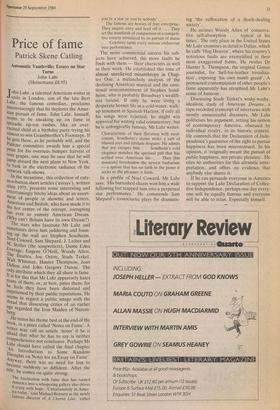Price of fame
Patrick Skene Catling
Automatic Vaudeville: Essays on Star Turns John Lahr (Heinemann £8.95)
John Lahr, a talented American writer in exile in London, son of the late Bert Lahr, the famous comedian, proclaims unconvincingly that he deplores the Amer- ican pursuit of fame. JOhn Lahr, himself, seems to be sneaking up on fame in sporadic tip-toe rushes, like an over excited child at a birthday party trying his utmost to win Grandmother's Footsteps. If he gets there, as he probably will, and the Pulitzer committee awards him a special Prize for his overseas bumper harvest of Sour grapes, one may be sure that he will Pimp aboard the next plane to New York, to bask in the electronic radiance of the network talk-shows.
In the meantime, this collection of cute- as-a-button short articles ('essays'), written since 1975, presents some interesting and entertainingly bitchy ideas about an assort- ment of people in showbiz and letters, American and British, who have made it to the hot centre of the corrupt, corrupting but ever so yummy American Dream. (Why can't Britain have its own Dream?)
The stars who fascinate Mr Lahr and Sometimes drive him juddering and foam- ing up the wall are Stephen Sondheim, Noel Coward, Sam Shepard, J. Leiber and
1. Stoller (the songwriters), Dame Edna Everage, Eugene O'Neill, Woody Allen, The Beatles, Joe Orton, Studs Terkel, Walt Whitman, Hunter Thompson, Joan Didion and John Gregory Dunne. The only attribute which they all share is fame. It is for this that Mr Lahr apparently hates Many of them, or, at best, pities them, for he feels they have been distorted and imprisoned by their public reputations. He seems to regard a public image with the dread that dissenting critics of an earlier age regarded the Iron Maiden of Nurem- berg.
, He states his theme best at the end of the 1009k, in a piece called 'Notes on Fame'. A writer may call an article 'notes' if he is afraid that what he has to say is neither comprehensive nor conclusive. Perhaps Mr Lahr should have called the final chapter An Introduction to Some Random Thoughts on Notes for an Essay on Fame'. llYwaY, there was no need for him to e suddenly so diffident. After the title, he comes on quite strong: The fascination with fame that has turned America into a whispering gallery also drives it crazy with hope. 'Unfortunately in Amer- ica today,' said Michael Bennett as the newly famous director of A Chorus Line. 'either
you're a star or you're nobody' . .
The famous are heroes of free enterprise. They inspire envy and feed off it . . . They set the standards of comparison in a competi- tive society trivialized by its pursuit of status . . . Celebrity turns every serious endeavour into performance.
The more commercial success his sub- jects have achieved, the more faults he finds with them — their characters as well as their work. He established this tone of almost unrelieved misanthropy in Chap- ter One, a melancholy analysis of the declining American musical and the emo- tional noncommitment of Stephen Sond- heim, who is probably Broadway's wealth- iest lyricist. If only he were living a desperate hermit life in a cold-water, walk- up tenement in Spanish Harlem, if only all his songs were rejected, he might win approval for writing valid commentary, but he is unforgivably famous. Mr Lahr writes:
Characteristic of their flirtation with mod- ernism, Sondheim's shows make a cult of blasted joys and jubilant despairs. He admits that joy escapes him . . . Sondheim's cold elegance matches the spiritual pall that has settled over American life . . . They [his musicals] foreshadow the newest barbarism a nation that has no faith in the peace it seeks or the pleasure it finds.
In a profile of Noel Coward, Mr Lahr says: 'His burnished charm won him a wide following but trapped him into a perpetual star performance.' He commends Sam Shepard's iconoclastic plays for dramatis-
ing 'the suffocation of a death-dealing society'.
He accuses Woody Allen of 'conserva- tive self-absorption . . . typical of his times'. The only place in the United States Mr Lahr examines in detail is Dallas, which he calls 'Hog Heaven', where his country's notorious faults are exemplified in their most exaggerated forms. He reviles Dr Hunter S. Thompson, the original Gonzo journalist, for 'hell-for-leather trivializa- tion', exposing 'his own numb greed'. A protracted contemplation of other people's fame apparently has atrophied Mr Lahr's sense of humour.
Discussing Studs Terkel's wishy-washy, idealistic study of American Dreams, a tape-recorded transcript of interviews with mostly unsuccessful dreamers, Mr Lahr politicises his argument, setting his notion of contemporary America, obsessed by individual rivalry, in its historic context. He contends that the Declaration of Inde- pendence's guarantee of the right to pursue happiness has been misconstrued. In his opinion, it 'originally meant the pursuit of public happiness, not private pleasure'. He cites no authorities for this altruistic inter- pretation, and offers no evidence that anybody else shares it.
If he can persuade everyone in America to support the Lahr Declaration of Collec- tive Independence, perhaps one day every- one will be equally famous and everyone will be able to relax. Especially himself.














































 Previous page
Previous page